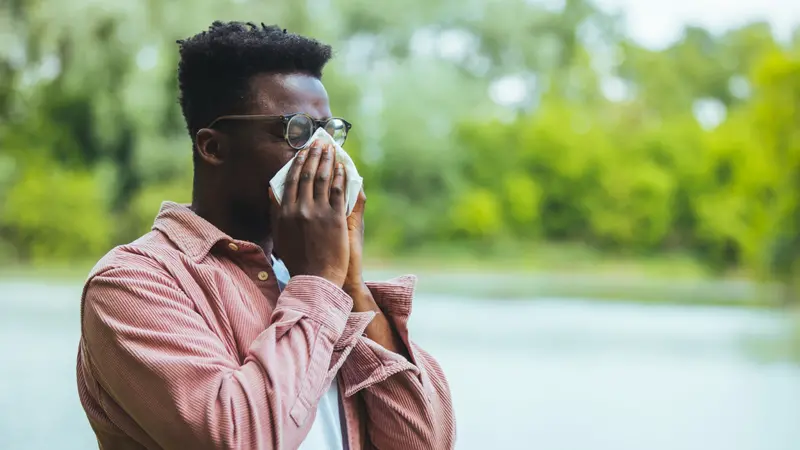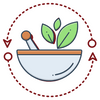

Complementary and Alternative Medicine (CAM)

Complementary and Alternative Medicine (CAM)
Complementary Approaches to Seasonal Allergies
If you have an allergy, your immune system reacts to something that doesn’t bother most other people. People with seasonal allergies (also called hay fever or allergic rhinitis) react to pollen from plants. Symptoms may include sneezing, coughing, a runny or stuffy nose, and itching in the eyes, nose, mouth, and throat.
What the Science Says
Complementary approaches can be classified by their primary therapeutic input (how the therapy is taken in or delivered), which may be:
- Nutritional (e.g., special diets, dietary supplements, herbs, probiotics, and microbial-based therapies).
- Psychological (e.g., meditation, hypnosis, music therapies, relaxation therapies).
- Physical (e.g., acupuncture, massage, spinal manipulation).
- Combinations such as psychological and physical (e.g., yoga, tai chi, dance therapies, some forms of art therapy) or psychological and nutritional (e.g., mindful eating).
Many complementary health approaches have been studied for allergic rhinitis. There’s some evidence that a few may be helpful.
Psychological and Physical Approaches
- A 2015 evaluation of 13 studies of acupuncture for allergic rhinitis, involving a total of 2,365 participants, found evidence that this approach may be helpful.
- Rinsing the sinuses with a neti pot (a device that comes from the Ayurvedic tradition) or with other devices, such as nebulizers or spray, pump, or squirt bottles, may be a useful addition to conventional treatment for allergic rhinitis.
Nutritional Approaches
- A 2007 evaluation of six studies of the herb butterbur for allergic rhinitis, involving a total of 720 participants, indicated that butterbur may be helpful.
- Researchers have been investigating probiotics (live microorganisms that may have health benefits) for diseases of the immune system, including allergies. Although some studies have had promising results, the overall evidence on probiotics and allergic rhinitis is inconsistent. It’s possible that some types of probiotics might be helpful but that others are not.
- It’s been thought that eating honey might help to relieve pollen allergies because honey contains small amounts of pollen and might help people build up a tolerance to it. Another possibility is that honey could act as an antihistamine or anti-inflammatory agent. Only a few studies have examined the effects of honey in people with seasonal allergies, and their results have been inconsistent.
- Many other nutritional approaches have been studied for allergic rhinitis, including astragalus, capsaicin, grape seed extract, omega-3 fatty acids, Pycnogenol (French maritime pine bark extract), quercetin, spirulina, stinging nettle, and an herb used in Ayurvedic medicine called tinospora or guduchi. In all instances, the evidence is either inconsistent or too limited to show whether these products are helpful.
Side Effects and Risks
- People can get infections if they use neti pots or other nasal rinsing devices improperly. The U.S. Food and Drug Administration (FDA) has information on how to rinse your sinuses safely.
- Most important is the source of water that is used with nasal rinsing devices. According to the FDA, tap water that is not filtered, treated, or processed in specific ways is not safe for use as a nasal rinse. Sterile water is safe; over-the-counter nasal rinsing products that contain sterile saline (salt water) are available.
- Some tap water contains low levels of organisms, such as bacteria and protozoa, including amoebas, which may be safe to swallow because stomach acid kills them. But these organisms can stay alive in nasal passages and cause potentially serious infections. Improper use of neti pots may have caused two deaths in 2011 in Louisiana from a rare brain infection that the state health department linked to tap water contaminated with an amoeba called Naegleria fowleri.
- Acupuncture is generally considered safe when performed by an experienced practitioner using sterile needles. Improperly performed acupuncture can cause potentially serious side effects.
- Raw butterbur extracts contain pyrrolizidine alkaloids, which can cause liver damage and cancer. Extracts of butterbur that are almost completely free from these alkaloids are available. However, no studies have proven that the long-term use of butterbur products, including the reduced-alkaloid products, is safe.
- In healthy people, probiotics usually have only minor side effects, if any. However, in people with underlying health problems (for example, weakened immune systems), serious complications such as infections have occasionally been reported.
- Be cautious about using herbs or bee products for any purpose. Some herbs, such as chamomile and echinacea, may cause allergic reactions in people who are allergic to related plants. Also, people with pollen allergies may have allergic reactions to bee products, such as bee pollen, honey, royal jelly, and propolis (a hive sealant made by bees from plant resins). Children under 1 year of age should not eat honey.
- Talk to your health care provider about the best way to manage your seasonal allergies, especially if you’re considering or using a dietary supplement. Be aware that some supplements may interact with medications or other supplements or have side effects of their own. Keep in mind that most dietary supplements have not been tested in pregnant women, nursing mothers, or children.
REFERENCES
National Center for Complementary and Integrative Health. (2019, March). Seasonal allergies at a glance. U.S. Department of Health and Human Services. National Institutes of Health. https://www.nccih.nih.gov/health/seasonal-allergies-at-a-glance


 By
By







